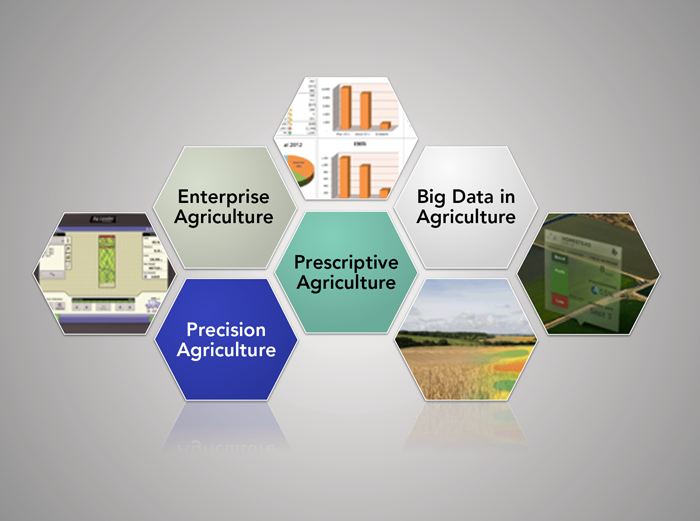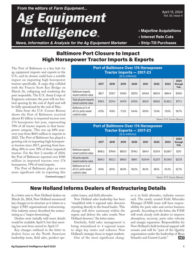In the latest episode we take a look at a report that suggests combines appear to be in the best shape of large ag equipment, the transition to “digital agriculture,” Exel Industries acquisition of Equipment Technologies and Apache Sprayers, and the merger of the Ohio-Michigan Dealers Assn. and the Mid-America Equipment Retailers Assn.
Leave a comment Get New Episodes Delivered to Your Inbox
On The Record is brought to you by Ingersoll Tillage.
 |
Ingersoll specializes in seedbed solutions. Whatever seedbed challenges you have, Ingersoll can give you the right tools to get the job done. For every tillage and planting practice, there's an ideal Ingersoll application.
We're interested in getting your feedback. Please feel free to send along any suggestions or story ideas. You can send comments to kschmidt@lessitermedia.com.
You May Also Be Interested In...
Succeeding as a Shortline Dealer: The Ultimate Wake-Up Call
Based on the experience of shortline dealers across the country, being cancelled by a major doesn't have to be the death knell of your business.
I’m managing editor Kim Schmidt, welcome to On The Record. Here’s a look at what’s currently impacting the ag equipment industry.
Slow Recovery Expected
It’s no secret that 2015 was a tough year for large ag equipment sales, marked by meaningful declines in demand. In Baird Equity Research’s 2016 Outlook, analyst Mig Dobre says further pressure in large ag is expected in 2016.
What may come as a surprise though is combines appear to be in the best shape, according to Dobre, as 2016 will mark the lowest level of combine retail sales in the group’s available data set.
|
FARM AFN: $28.60 –0.57 Closing Stocks as of 01/28/16 (Compared to Close on 1/14/16) |
He says, in conjunction with nearly record low combine retail sales, the seasonal peak in inventories in August was in line with the lows reached in 2003 and 2008. This suggests that potential for additional combine inventory destocking is limited.
He adds: "Following what is expected to be a 25-30% decline in large ag equipment demand in 2016, 4WD and combine retail sales will be at levels consistent with or below prior bottoms. While this suggests there is little likelihood for further meaningful downside in large ag equipment into 2017, the age of the existing fleet remains a potential headwind preventing a quick and meaningful recovery."
In addition, commentary from a variety of sources suggests that used equipment levels continue to remain high — particularly when it comes to late model equipment.
Dealers on the Move
Dealers on the Move this week include Sydenstricker Implement, Hoober and Livingston Machinery Co.
John Deere dealer Sydenstricker bought the John Deere portion of Schweissguth Brothers in Dutzow, Mo., effective Feb. 1. Schweissguth will continue to operate its Kubota dealership in Union.
Hoober, a Case IH dealer with 9 stores in Pennsylvania, Delaware, Maryland and Virginia, has moved its dealership in McAlisterville, Pa., to a larger facility in Mifflin town, Pa.
AGCO dealer Livingston Machinery, based in Chickasha, Okla., acquired the ag division of Warren Cat and will be opening a new location in Dalhart, Texas, on Feb. 1. With the acquisition, Livingston Machinery will expand its product line to feature Challenger and AgChem equipment.
Transitioning to Digital Agriculture
As technology continues to become more integrated into agricultural operations, a debatable question is at what point precision farming simply becomes farming.
Adoption of tools such as auto-steer and GPS are widespread, according to Ohio State Ag Engineer John Fulton. He estimates that about 70% of all farming acres in the U.S. are touched by some form of precision agriculture.
But today’s technology is only as good as the information it collects and ultimately, how it’s used to make better on-farm decisions. This is a work in progress, and Fulton estimates that only about 15% of U.S. farms utilize “prescriptive farming” practices, which includes working with third-party service providers for data management and analysis.
While this percentage is on the rise, Fulton notes that continued growth will depend in part on farmers’ and their service providers’ commitment to a systematic approach and evolution to digital agriculture.
“Long-term, I think most growers are not going to do their data management in house and we’re going to see 95-plus percent of them go out and get someone to do all of that management for them, as it relates to data. We’re very young into digital agriculture and I don’t see it turning around. We’re really going to see more data-driven decisions. We’re going to see that kind of thing grow and it’s going to be important to manage costs and ultimately profitability.”
In Ohio, Fulton says some of the most progressive farms are working with at least 3 different service providers for specific precision needs. In the future, he suggests that farmers may work with up to 10 different companies as part of a digital farming strategy.
Exel Industries Acquires Apache Sprayers
Consolidation among shortline manufacturers continues. First, Bestway was acquired by a private investor group earlier this month.
Now, ET Works, the manufacturer of Apache Sprayers, has agreed to a buyout by Exel Industries of France. Exel is the parent group of Hardi, Berthoud and Tecnoma sprayers.
ET Works will continue to do business with its current management under the Equipment Technologies and Apache names, and maintain its headquarters in Mooresville, Ind.
We caught up with Matt Hays, CEO of Equipment Technologies, to find out what advantages he sees with the new parent company.
“In terms of more strategic opportunities, like I said first and foremost they really appreciate the asset and they want to continue to nurture what we’re doing and are going to see to it by way of additional investments so we can keep those opportunities going in North America.
“But when you look at the rest of the world, they have a strong presence in many markets in which Apache already has some customers and some good will, most notably Ukraine and Russia. So markets where we already know our sprayers fit the market very well but we haven’t had a priority to really pursue international distribution. They bring an already built international distribution network in those markets. I think it will mean really good things for us from an export standpoint as well.”
OMEDA & MAERA Merge
Members of the Ohio-Michigan Equipment Dealers Assn. and the Mid-America Equipment Retailers Assn. voted to merge, forming the United Equipment Dealer Assn., effective Jan. 1.
We spoke with Kim Rominger, CEO and executive vice president for UEDA about what led to the merger and how it will benefit members.
With the consolidation of dealers and a number of members having stores across multiple state lines, Rominger says it was simply time to merge the associations.
Creating one, unified association allows dealers to join one common group across all locations, rather than having stores in different states join different associations.
He says the merger will also provide a bigger pool of experienced leadership for the association.
Implement & Tractor Archives
After University of Illinois researcher George McKibben built possibly the first no-till planter in the U.S. in 1955, Herndon, Ky., farmer Harry Young rigged his two-row Allis-Chalmers’ no-till planter to no-till 0.7 acres of corn in 1962.
This inspired Allis Chalmers to begin mass producing the No-Til planter soon after, which was widely considered the best of its kind during the 1970s. The planter had three tool bars: the first was equipped with No-Til coulters, the second carried the fertilizer boxes and the planter units were attached to the third. The planter prepared a narrow seedbed in stubble or sod and eliminated the need for plowing and discing.
In 1993, the Allis Chalmers No-Til planter was recognized by the Equipment Manufacturers Institute as one of the 100 most important developments in agriculture.
We always welcome your feedback. If you have any comments or story suggestions, you can send them to kschmidt@lessitermedia.com. Thanks for watching, I'll see you next time.






Post a comment
Report Abusive Comment